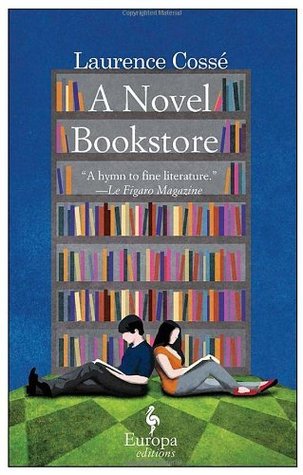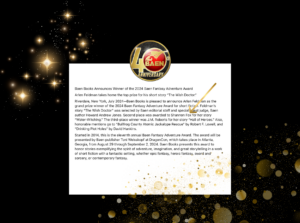By Laurence Cosse
Ivan, a one-time world traveler, and Francesca, a ravishing Italian heiress, are the owners of a bookstore that is anything but ordinary. Rebelling against the business of bestsellers and in search of an ideal place where their literary dreams can come true, Ivan and Francesca open a store where the passion for literature is given free reign. Tucked away in a corner of Paris, the store offers its clientele a selection of literary masterpieces chosen by a top-secret committee of likeminded literary connoisseurs. To their amazement, after only a few months, the little dream store proves a success. And that is precisely when their troubles begin. At first, both owners shrug off the anonymous threats that come their way and the venomous comments concerning their store circulating on the Internet, but when three members of the supposedly secret committee are attacked, they decide to call the police. One by one, the pieces of this puzzle fall ominously into place, as it becomes increasingly evident that Ivan and Francesca’s dreams will be answered with pettiness, envy and violence.

A Novel Bookstore is a very smart book. From the title (A Novel Bookstore) meaning both a novel (a new) bookstore and a bookstore of novels, it is very well thought out and well plotted.
Some might consider it pretentious. But A Novel Bookstore is very aware of that and its own ego. It’s self-reflecting, diving deep into the tiniest questions and logistics, throughout the entire rise (and fall) of the bookstore.
The first fifty pages are a bit slow because we are jumping around to a lot of characters, but the book really picks up when Van and Francesca start telling the history of their bookstore, The Good Novel.
Francesca and Van set out to open a bookstore that only sells “good” novels. They use a committee to try and provide the most unbiased opinion of what, exactly, constitutes a good bookstore.
Of course, this draws the ire of other people. One of the most central and compelling arguments of the opposition, is that how does anyone have the right to decide what a constitutes a good novel? Who gets to decide that for other people?
I feel that this is a particularly relevant argument for book blogs. What gets reviewed? Should we go all in and reveal our guiltiest pleasures or only review what we think people would be interested in or what happens to make us appear most cultured?
In the early days of my blog, I only reviewed what I could enthusiastically recommend. Not the things that were just okay or even bad, but the things that were truly outstandingly great, that I wouldn’t hesitate to recommend to anyone.
But those novels are few and far between, and above all, hard to discover. As the audience of my blog grew, I found myself wanting to talk to them more. And what made the most sense to me, was to start reviewing everything I read.
So yes, you’ll find a little Tolstoy, a little Nabokov, on this blog. But you’ll also find a lot of beach reads and borderline-screenplay thrillers. Because, while I read a lot and consider myself to have good taste, I still find enjoyment in those books that don’t necessarily hold up the gold bar of English literature. Maybe they won’t be remembered in five or fifteen years. But I don’t particularly care.
A long time ago, I decided that my own work, when and if it gets published, is unlikely to be remembered in the annals of history as being superbly correct and well-written or unfailingly beautiful. And I decided that I just didn’t care.
I want to write stories both because they are within me, fighting to get out, but also because I hope I can give something to one reader. Whether that’s company on the layover from hell at an airport, a companion for an afternoon at the beach, or a friend at their darkest hour. That’s what I consider my own personal benchmark of success to be. Yes, I’d like to be successful and make lots of money, but the end all and be all of that, is that many, many, MANY people will be reading my book then. It will be well and truly out in the world, for better and for worse, and I can only hope that for however many critics, that someone will find my work to be special to them in some way.
Does having a bookstore that sells only GOOD books sound like a nice idea? In theory it does. And that theory can only cross over into reality if it’s presented as an alternative to other bookstores, rather than as the sole and proprietary idea of what a bookstore should be. In the way that you go to a comic bookstore for a wide selection of comics and a Christian bookstore for a broad variety of works dealing with a faith, a bookstore that sells only good books fills its own sort of niche.
This is more or less the answer The Good Novel gives to its critics. But they won’t be satisifed.
There’s a mystery in A Novel Bookstore about who is trying to drag them down and ruin their successful business. While we ultimately receive an answer, the mystery that is so central to the plot of the novel…doesn’t really end up mattering that much. What matters are the questions that creating a bookstore filled only with “good” books raises. And those questions and answers are what makes this book particularly interesting and readable.
Overall, I would recommend this book if you’re an avid reader, especially of “good” books, and for fans of The Elegance of the Hedgehog. They felt very similar in tone and feel which (I’m pretty sure) is because they had the same translator from French to English.
Note: At the end of my copy, it invites you to “join the conversation online”. I checked it out and noticed the blog of book reviews hadn’t been updated in some time. It made me feel sad as the author attempted to take the online forum part of The Good Novel online, but it seems to have flopped. It draws an interesting parallel to the story.



